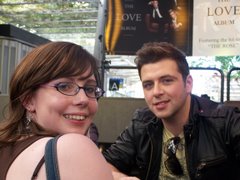Of all the senses, it is the sense of smell that has least been explored in the realm of the silver screen. And with good reason. How do you possibly translate a sense so limitlessly varying and so personal an experience into one that can be encapsulated with sound and images?
Director Tom Twyker takes on the onerous task of translate the olfactory to the audiovisual, in his film Perfume: The Story Of A Murderer. Adapted from German author Patrick Süskind’s ‘Das Parfum’, it tells the story of Jean-Baptiste Grenouille (Ben Whishaw), born in the stench of eighteenth century Paris, who possesses a unique and powerful sense of smell.
Whishaw’s Grenouille is a striking character, though whether he can be considered a character is debatable. He is rather a state of mind, an anthropomorphic quest to find the world’s greatest aroma through any means necessary, his permanently mystified gaze a testament to the skill of the actor at manipulating his character’s emotion with subtle strength.
Through the brilliant uses of colour, sound, and cinematography, it becomes astoundingly easy to follow Grenouille’s olfactory expedition. Every scent is laid bare in a way that is astonishing in its ingenuity, and even for those not blessed with a sympathetic sense of smell, the film is a visual masterpiece.
However in the story it falls short. The narrative is excellent, an intriguing tale of murder and desire, yet the characters struggle to elect a protagonist. At times it is the tormented Grenouille we align with, yet just as quickly we can become immersed in hatred for him, and sympathy for his victims. While this could have been used to great effect, the transition is not as seamless as it needs to be, lending a feeling of unwelcome disconcertion.
Still, with flawless acting (Alan Rickman and Rachel Evan-Wood are outstanding, though it is Dustin Hoffman who runs off with his portion of the show), and with a delicate use of his audiovisual facilities, Twyker’s film is a superb example of the power cinema can wield in the right hands. A definite must-see, if only for the rare chance to see something truly different and breathtaking.
Wednesday, March 14, 2007
Subscribe to:
Post Comments (Atom)

4 comments:
the attempt to portray smell in a film is an admirable feat to take on, and to do well at is even better.
the emphasis on one sense reminds me (as i said last nite) of children of men (2006), which uses sound very interestingly (see my post for more).
now of course it is far easier to emulate sound on screen, especially these days with dolby digital surround everything, than it is to do smell, so my (hypothetical) hat is off to tom twyker. but what alfonso cuarón did with children of men is equally innovative and noteworthy.
the audience are drawn into a (hyper-)real soundscape of the appocolyptic world that clive owen is in. as different high impact sounds occur on screen, they are carried on as a ringing sound to give the sensation of how the character would be experiencing the after-effect of that loud sound.
i should also note that the film used a creative commons sampling plus licensed sound from the freesound project at universitat pompeu fabr. to date it is the first known major motion picture to legally use a sample from freesound.
see the cc post for more info.
Nice.
Post a Comment